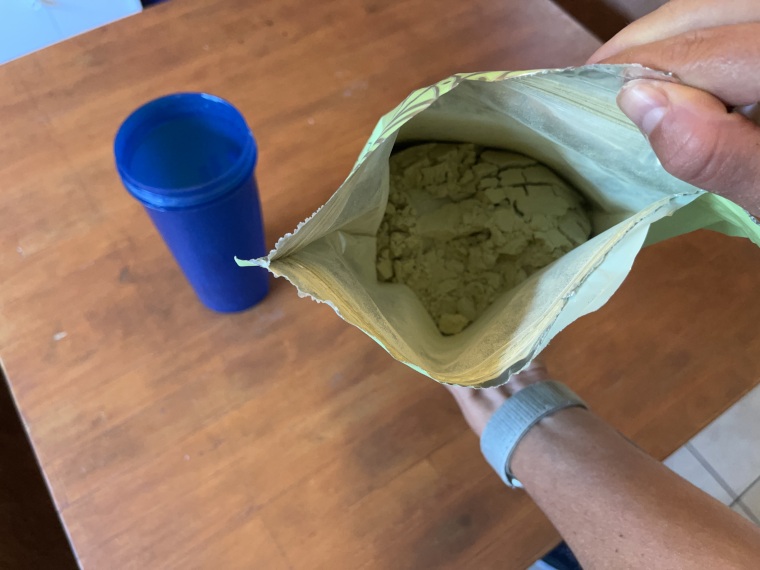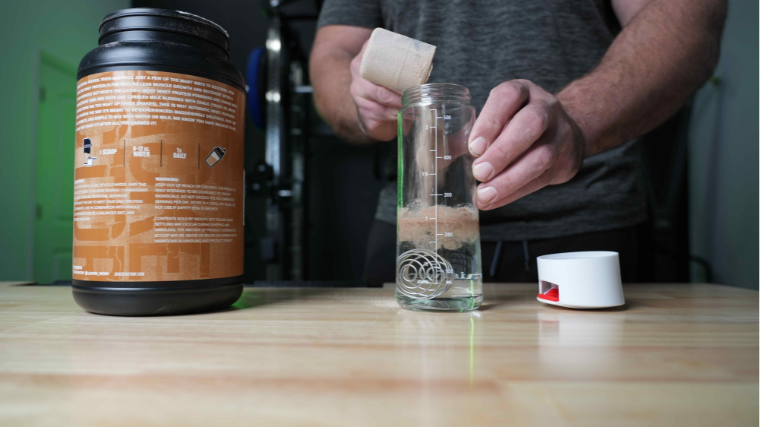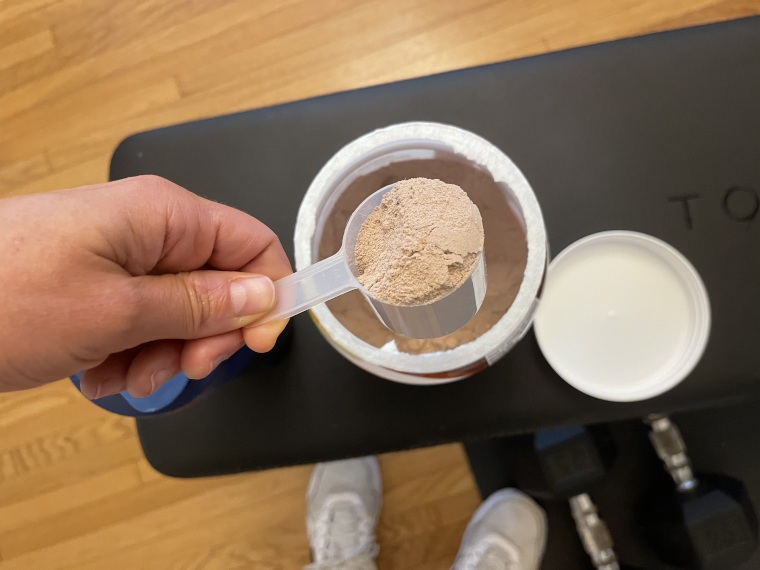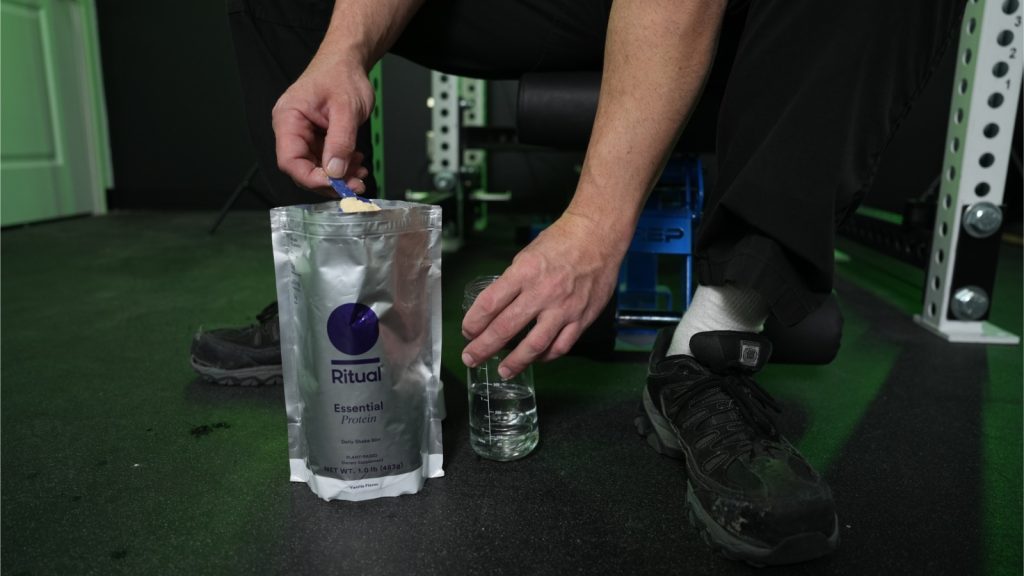The best protein powders can be a tasty and convenient way to up your daily protein intake no matter your fitness level. Even the bulkiest of tubs can go pretty quickly if you mix up a shake everyday. But what about that lonely container you forgot about in the back of the cabinet? Before dusting it off and taking a scoop, first glance at the expiration date. If you’re close to that deadline, you may wonder, “Does protein powder expire?”
Many packages list a best-by or use-by date, but navigating what exactly that means — or identifying signs of spoilage — can be tricky. With so many different sources of protein in these powders, you’ll have to get a little scientific to figure out if you need to toss that old tub or you can salvage a few scoops. Check out what our team of nutritional experts has to say about how long you can expect your protein powder to last.
Editor’s Note: The content on BarBend is meant to be informative in nature, but it should not be taken as medical advice. When starting a new training regimen and/or diet, it is always a good idea to consult with a trusted medical professional. We are not a medical resource. The opinions and articles on this site are not intended for use as diagnosis, prevention, and/or treatment of health problems. They are not substitutes for consulting a qualified medical professional.
Does Protein Powder Expire?
The most important factors for the expiration of protein powders are the temperature and humidity level at which they were stored. As our expert reviewer and registered dietitian Destini Moody explains, identifying an expired powder can be tough. “Like all other foods, protein powder does get past its prime and expire eventually,” she says. “However, it can be more difficult than other food or dietary supplements to detect when this time has come.”
If the idea of spoiled milk has you spooked, rest-assured, even the best whey protein powders protein powders can remain microbiologically safe for long periods of time because they are dry. (1)(2)(3)
Protein powders often include other additives to help them last longer, as well. When you’re desperate to figure out whether it’s safe to scoop that tub of protein powder that’s been sitting on your back shelf for goodness knows how long, you’ll likely look to find a stamped date. It’s important to note the language used on packaging when you’re checking the expiration date on your protein powder.
The phrase “best before” generally means the product has a long shelf life. Some foods, even dairy, marked “best before” have been found to still be microbiologically safe six months after their date. (4) However, while safe, the quality of the food may still deteriorate, and therefore not be preferable for those looking for optimal performance.

The phrase “sell by” is used if the food or product can spoil quickly and cause direct harm to human health when used after the date. (4) So if you’re considering whether to consume something after its sell-by date, you might want to proceed with even more caution compared to your “best before” options.
How to Tell If Your Protein Powder Is Expired
As one of the best supplements for muscle growth, you’ll want to make sure none of your protein powder goes to waste. But how can you tell if it has expired?
“Studies show that it depends heavily on what climate you live in, as protein powders expire more rapidly in hot or humid climates,” says our expert reviewer and registered dietitian Destini Moody. “Under normal conditions — stored in a dry, cool place around room temperature — milk-based protein powders can be good to consume for 18 to 19 months. Protein powder that contains additives and preservatives like soy lecithin or plant-based protein powder may last even longer.”

Depending on the source of the protein, this range can vary. One study showed that egg white powder increased in viscosity (it got thicker) after just 30 days of being stored at room temperature. (5) So while egg white protein should be refrigerated after opening, rice protein powder may last up to two years on the shelf. (1)(2)(3)(6)
If your powder is labeled with a “sell by” date, err on the side of caution when consuming it afterward. But if it has a “best by” date, research suggests that even non-powdered dairy may be alright as long as six months after.

When you discover that old powder in the corner of your garage gym, here are some signs to look for (in addition to checking the date and considering the average storage temperature).
- Yellow color or other discoloration from what it looked like when you purchased it;
- A foul or sour smell;
- A clumpy appearance;
- A rancid taste.
If these signs are showing up in your powder, don’t pass go. But if they’re not, you may well be alright to scoop some into your next protein shake.
Is It Safe to Drink Expired Protein Powder?
If your powder has passed the smell check and looks normal past the “best by” date, it’s probably safe. But if you notice that it’s been exposed to moisture, it has almost certainly been the site of some microbial growth. “Protein powder is called in food safety a ‘low moisture food,’” our expert reviewer and registered dietitian Destini Moody says. “Microbes grow best in moist conditions, which is why dried food like jerky, dried fruit, or protein powder don’t need to be refrigerated when their hydrated counterparts do.”

Bacteria — like those that cause food-borne illness — grow best in humid, warm environments with little airflow. If this describes your kitchen cabinet, you should proceed with caution if you dare to try that expired protein powder. (7)
“Without signs of spoilage, protein powder is likely safe to consume a few weeks past its expiration date,” Moody adds. “That said, be smart. If you forgot about a tub of whey protein powder in the back of your pantry 3 years ago and it still smells ‘fine,’ it could still make you sick.”
How To Store Protein Powder Long-Term
Most hulking tubs of protein powder won’t fit in your fridge, sure. But luckily you don’t need to keep your favorite high-protein muscle-building supplements chilled for them to be effective. That said, different types of protein powder have their own storage requirements. Here’s what you need to know.
Whey Protein
Yes, it’s dairy-based — but that doesn’t mean it’s going to go bad quickly. Whey protein powder has been found to have a shelf life of 12 to 19 months when stored at about 70 degrees Fahrenheit and humidity of 35 percent. (1) As long as you store your protein powder at a normal temperature and keep it dry, it can last up to two years.
Whey Concentrate
Temperature makes a big difference when you’re storing whey concentrate powder. The whey concentrate stored at 95 degrees Fahrenheit lasted nine months, which isn’t too terrible. However, the powder stored at 70 degrees Fahrenheit lasted up to 18 months. (2)
At nine months, the powder in this study stored at 95 degrees was thrown out because its appearance began to yellow and become unsatisfactory. It also showed a lysine decrease and an increase in water activity. (2) Even with airtight containers of protein powder, if you take a peek and find it has yellowed, it might be time to part ways with it.
Whey Isolate
Studies on the best whey isolates are limited, but depending on storage, research suggests that these can last anywhere from eight to 15 months. (3) If your whey isolate is within that time range, you can also use your senses to assess it. Signs of protein powder gone bad include bad smell and taste, as well as clumping and a change in color. (2)
Casein Protein
Casein is derived from bovine milk. (8) It is a dairy-based protein but is still dried in the process of turning it into powder. This drying makes it less susceptible to bacterial contamination. When stored at correct temperatures, it may have a similar shelf life to whey proteins.
Egg White Powder
Compared to whey and casein, egg white powder appears to be a little less shelf-stable. In one study, the powder changed significantly after two months at 77 degrees Fahrenheit and above, especially when exposed to moisture. It fared best at 39 degrees Fahrenheit, so it’s probably a good idea to keep your egg white powder refrigerated. (5)
Pea Protein Powder
Pea protein is a non-dairy, plant-based protein source that can be turned into powder. Vegetables can eventually expire, but much like dairy-based options, the best vegan protein powders also include additives to help its shelf life last longer.
While research is limited regarding when pea protein becomes unsafe to ingest, you might choose to follow the rules of smell and appearance. Ask yourself how close it looks to its appearance when you initially purchased it. Without any milk present, there’s less danger of microbiological damage, even past the expiration date.
Hemp Protein Powder
Hemp seeds may not have as much protein as other sources, but they are still another option for a vegan protein powder. A study showed that they’ve been found to have a similar amount of amino acids as other grains and nuts. (9)
There are limited studies on hemp protein powder and whether or not it can expire. Hemp seeds, like anything else, can expire after a while. To be safe, store your hemp protein powder in a cool, dry area away from direct sunlight.
Soy Protein Powder
Soy protein has been shown to be equally as effective as whey protein when building muscle mass and strength in combination with resistance training. (10) The best soy protein powders, like many other types, usually have expiration dates of up to two years. While it doesn’t contain dairy, soy protein is still susceptible to mold if not kept in a cool, dry space.
Rice Protein Powder
Rice protein powder boasts a shelf life of at least two years if kept sealed at temperatures below 80 degrees Fahrenheit, though this might be shorter once the package has been opened. (6) Some protein powders come just as they are — pure protein powder, for example, may come unflavored and unaccompanied by any other ingredients. On the other hand, other protein powders come with a wide array of other ingredients, ranging from natural sugars and artificial sweeteners to digestive enzymes and amino acids.
Conclusion
Protein powders of all types will eventually expire. Risks of expiration include microbiological damage and mold growth, which can have a damaging effect on human health. Luckily, most types of protein powder can last up to two years. This is due to additives in some cases, but also the durability of a dry supplement stored at correct temperatures with minimal humidity.
When in doubt, check for clumps and rancid smells in the protein powder you’ve had for a while. If it’s not too far past its expiration date, studies suggest that it should be okay to stir into your next post-workout shake or smoothie.
FAQs: Does Protein Powder Expire?
Is it OK to use expired protein powder?
First, always check the best-by date. If the protein powder has been exposed to moisture, there has likely been some microbial growth. (7) “If it’s been a long time since you’ve cracked open that tub and you notice an off-smell or taste, excessive clumping, or discoloration, it’s likely a good idea to throw it out,” says our expert reviewer and registered dietitian Destini Moody.
How long does protein powder last after being opened?
Studies have shown that, depending on the source of the protein (whey, soy, rice, among others), your protein powder may last anywhere between 8 and 19 months if it has been stored at 70 degrees and in a dry place. Some varieties (like egg white powder) should be refrigerated, but others (like rice protein powder) might last for up to two years in proper storage conditions. (1)(2)(3)(5)(6)
How do I keep protein powder fresh?
Depending on the source of protein, it may need to be refrigerated. Many high-quality protein supplements in powder form contain preservatives that allow them to be stored in cool, dry places like kitchen cabinets or pantries. These can help extend the shelf life of protein powder.
References
- Sithole, R., McDaniel, M. R., & Goddik, L. M. (2005). Rate of maillard browning in sweet whey powder. Journal of dairy science, 88(5), 1636–1645.
- Tunick, M. H., Thomas-Gahring, A., Van Hekken, D. L., Iandola, S. K., Singh, M., Qi, P. X., Ukuku, D. O., Mukhopadhyay, S., Onwulata, C. I., & Tomasula, P. M. (2016). Physical and chemical changes in whey protein concentrate stored at elevated temperature and humidity. Journal of dairy science, 99(3), 2372–2383.
- Wright, B. J., Zevchak, S. E., Wright, J. M., & Drake, M. A. (2009). The impact of agglomeration and storage on flavor and flavor stability of whey protein concentrate 80% and whey protein isolate. Journal of food science, 74(1), S17–S29.
- Zielińska D, Bilska B, Marciniak-Łukasiak K, Łepecka A, Trząskowska M, Neffe-Skocińska K, Tomaszewska M, Szydłowska A, Kołożyn-Krajewska D. Consumer Understanding of the Date of Minimum Durability of Food in Association with Quality Evaluation of Food Products After Expiration. Int J Environ Res Public Health. 2020 Mar 3;17(5):1632. doi: 10.3390/ijerph17051632. PMID: 32138334; PMCID: PMC7084339.
- Zhang T, Tang Y, Ge H, et al. Storage impact on egg white powder’s physical and functional properties. Journal of the Science of Food and Agriculture. 2023 Jun;103(8):3799-3811. DOI: 10.1002/jsfa.12274. PMID: 36251338.
- U.S. Food and Drug Administration. (n.d.). GRAS Notice 000609 – Rice Protein. FDA.
- Qiu Y, Zhou Y, Chang Y, Liang X, Zhang H, Lin X, Qing K, Zhou X, Luo Z. The Effects of Ventilation, Humidity, and Temperature on Bacterial Growth and Bacterial Genera Distribution. International Journal of Environmental Research and Public Health. 2022; 19(22):15345.
- Miller, M. J., Witherly, S. A., & Clark, D. A. (1990). Casein: a milk protein with diverse biologic consequences. Proceedings of the Society for Experimental Biology and Medicine. Society for Experimental Biology and Medicine (New York, N.Y.), 195(2), 143–159.
- House, J. D., Neufeld, J., & Leson, G. (2010). Evaluating the quality of protein from hemp seed (Cannabis sativa L.) products through the use of the protein digestibility-corrected amino acid score method. Journal of agricultural and food chemistry, 58(22), 11801–11807.
- Messina, M., Lynch, H., Dickinson, J. M., & Reed, K. E. (2018). No Difference Between the Effects of Supplementing With Soy Protein Versus Animal Protein on Gains in Muscle Mass and Strength in Response to Resistance Exercise. International journal of sport nutrition and exercise metabolism, 28(6), 674–685.